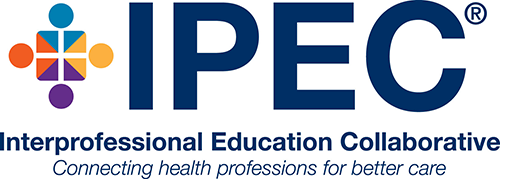About LINC
Guided By National Consensus
The most widely accepted definition of interprofessional education, or IPE, comes from the World Health Organization: “When students from two or more professions learn about, from, and with each other to enable effective collaboration and improve health outcomes.”
 The Interprofessional Education Collaborative (IPEC), an organization comprised of 21 professional associations representing the majority of health professions colleges and schools throughout the US, included this definition in their seminal publication, Core Competencies for Interprofessional Collaborative Practice, first published in 2011, and updated in 2016. The IPEC core competencies were adopted within LINC as UT Health San Antonio’s shared IPE framework.
The Interprofessional Education Collaborative (IPEC), an organization comprised of 21 professional associations representing the majority of health professions colleges and schools throughout the US, included this definition in their seminal publication, Core Competencies for Interprofessional Collaborative Practice, first published in 2011, and updated in 2016. The IPEC core competencies were adopted within LINC as UT Health San Antonio’s shared IPE framework.
 The Health Professions Accreditors Collaborative (HPAC) is an analogous organization comprised of 25 US health professions accrediting bodies. HPAC partnered with the National Center for Interprofessional Practice and Education
The Health Professions Accreditors Collaborative (HPAC) is an analogous organization comprised of 25 US health professions accrediting bodies. HPAC partnered with the National Center for Interprofessional Practice and Education and, in 2019, released another seminal publication in the field, Guidance on Developing Quality Interprofessional Education for the Health Professions. Recommendations from the HPAC-National Center consensus guideline were adopted within LINC as our roadmap to systematically pursue IPEC core competency development throughout UT Health San Antonio.
and, in 2019, released another seminal publication in the field, Guidance on Developing Quality Interprofessional Education for the Health Professions. Recommendations from the HPAC-National Center consensus guideline were adopted within LINC as our roadmap to systematically pursue IPEC core competency development throughout UT Health San Antonio.
Our pursuit of IPEC core competencies within LINC has led us to categorize IPE activities into three distinct types, which we embrace as equally important:
- Didactic IPE activities take place in classroom or simulation settings (including online) as part of formal curricula leading to a transcript designation (e.g., credit-bearing coursework)
- Clinical IPE activities take place in clinical settings, in the context of care delivery, as part of formal curricula leading to a transcript designation (e.g., credit-bearing clinical rotation/practice experience)
- Co-Curricular IPE activities take place outside of formal curricula as volunteer experiences to augment learning/professional development and do not lead to a transcript designation
Empowered Contributors Focused on Scholarship
Empowering Schools and Programs
 In accordance with HPAC recommendations, and led by the LINC Academic Affairs Council, schools and programs throughout UT Health San Antonio have been empowered to create longitudinal, program-specific IPE Plans that include strategically developed and sequenced didactic, clinical, and co-curricular IPE activities. These IPE Plans are rooted in profession-specific accreditation mandates or other profession-specific educational targets (e.g., entrustable professional activities), and they are approved or endorsed via faculty governance processes within each school or program. While some elements within the 12 IPE Plans that have been developed to date are the same, such as a series of university-wide foundational learning modules called the LINC Common IPE Experience and a university-wide assessment strategy called the LINC Core IPE Measurement Plan, the overall IPE experience of learners from different educational programs at UT Health San Antonio varies. Just as the roles, responsibilities, and professional activities of different team members vary, so too must their preparation. We celebrate this diversity within LINC and empower schools and programs to determine the quantity and variety of IPE that makes the most sense for them.
In accordance with HPAC recommendations, and led by the LINC Academic Affairs Council, schools and programs throughout UT Health San Antonio have been empowered to create longitudinal, program-specific IPE Plans that include strategically developed and sequenced didactic, clinical, and co-curricular IPE activities. These IPE Plans are rooted in profession-specific accreditation mandates or other profession-specific educational targets (e.g., entrustable professional activities), and they are approved or endorsed via faculty governance processes within each school or program. While some elements within the 12 IPE Plans that have been developed to date are the same, such as a series of university-wide foundational learning modules called the LINC Common IPE Experience and a university-wide assessment strategy called the LINC Core IPE Measurement Plan, the overall IPE experience of learners from different educational programs at UT Health San Antonio varies. Just as the roles, responsibilities, and professional activities of different team members vary, so too must their preparation. We celebrate this diversity within LINC and empower schools and programs to determine the quantity and variety of IPE that makes the most sense for them.
Emphasizing Collaborative Scholarship
LINC is an incubator that seeks to leverage the creativity, talent, and ambition of our faculty, staff, and students to advance IPE at UT Health San Antonio. Decisions about IPE programs to develop, projects to pursue, and partnerships to form emanate from a single focal point: collaborative scholarship. We seek to transform IPE within our local environment, informed by the latest literature, from a position that will allow us to contribute to the national conversation within the field of IPE. In other words, we begin each program, project, and partnership with collaborative scholarship in mind, in the hopes that our efforts at UT Health San Antonio might positively impact and influence our colleagues throughout the health professions.
